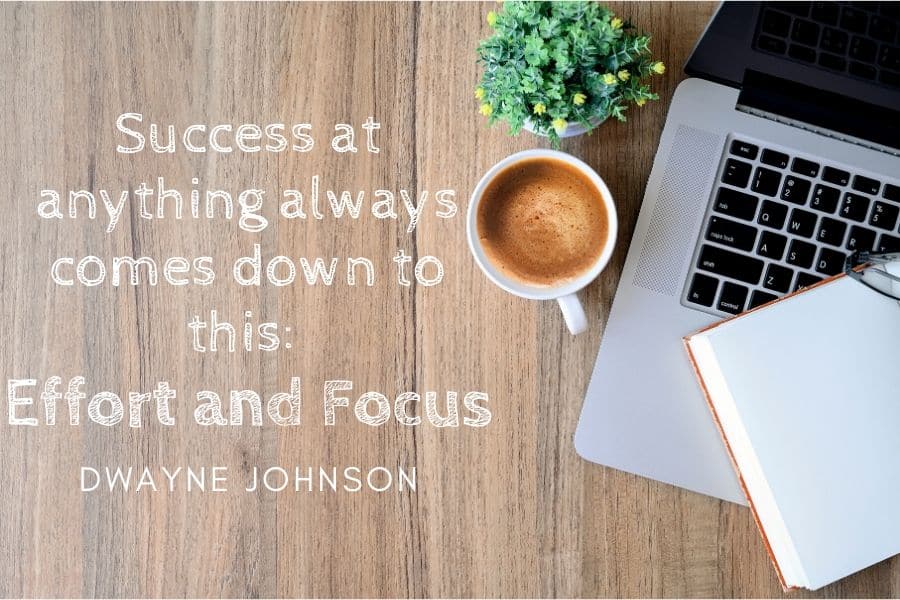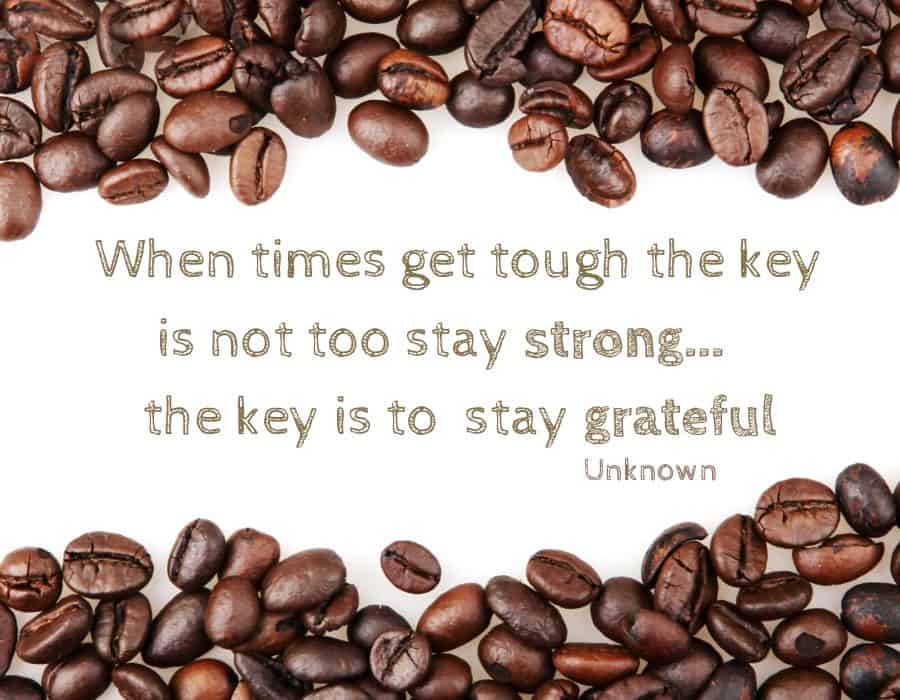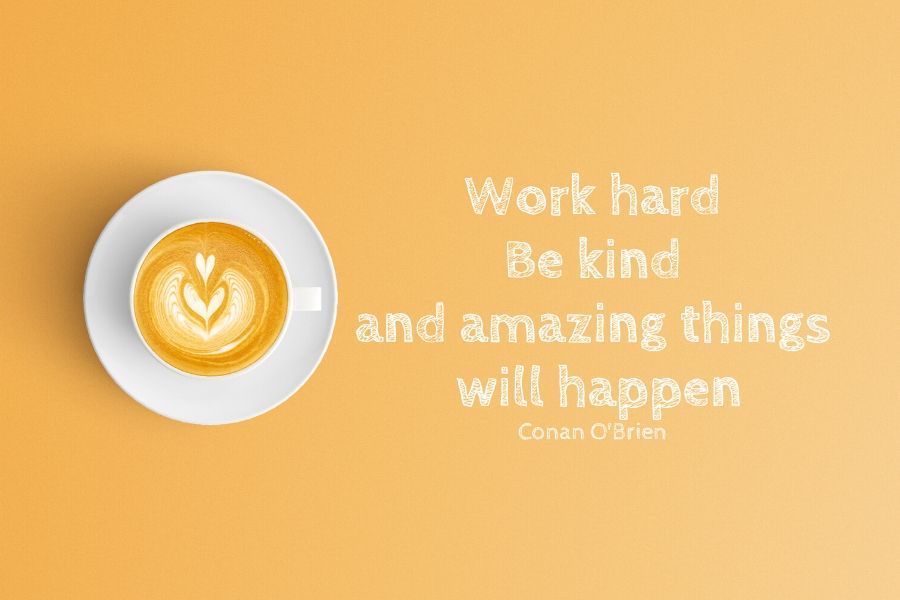
This definitely is a tricky question to answer. And it depends on your circumstances and life goals. However, I will try to tell our story and advice, based on my experience, ups and downs, hits and misses, and pains and fulfillments, of having our own small coffee shop.
You become a successful coffee shop owner by having a clear business and tactic plan to follow, while making focused adjustments towards a clear end goal, having engaged and well-trained employees, and offering a great quality of product and customer service.
In our perspective, you become a successful coffee shop owner when you are able to achieve a financially independent and stable business while at the same time enjoy your personal life.
Follow along to read about each of these aspects and a lot more. They are all based in our experience as owners of a small coffee shop. We hope this information can inspire and be helpful to all those aspiring coffee shop owners as well as actual coffee shop owners. I believe you never stop learning, ourselves included.
Okay, let’s get to it.
First and foremost: Establish goals

The dictionary defines success as “the accomplishment of an aim or purpose”.
Being a successful coffee shop owner can be seen from many perspectives: from the financial stability of the business but also from the personal satisfaction of the owner.
So first, what are your personal goals when having a coffee shop? What is the reason for you wanting to have a coffee shop? The answer to this question is actually very important and may influence the type of coffee shop you may have.
Are you seeking for a high sales volume coffee shop, or more like a quiet artistic small volume place? How do you envision yourself as a coffee shop owner?
Are there other reasons you might have to open up a coffee shop? For example, do you seek also to have freedom of time to do as you like? Do you want to be able to spend more time with your family?
Secondly, what are your goals for the coffee shop: financially, socially and environmentally speaking.
For example:
- Financial goals: to be able to break even in a time frame of one year.
- Social goals: to donate to certain charity a certain amount of money after one year of operating.
- Environmental: to minimize the impact of the coffee shop operation on the environment.
It is said that objectives should be smart. This means that they should have a clear parameter to measure if they are achieved or not.
For example, you may have a clear number on to what sales volume and costs may be necessary to achieve a break-even point in a certain time frame. This is something you could measure with your point of sale system (POS) and your monthly costs.
Establishing your objectives and goals is a clear way of measuring whether or not you are successful. Or whether or not you are close or far away from your goal.
Also, objectives and goals allow you to have a clear vision of where you are headed. This is especially important when running your coffee shop, for your day to day may consume you and tempt you to drive away from your objectives. Having them written and read constantly is a good way to monitor progress and keep your end goal in mind.
A good way to establish goals and objectives, as well as much related information like analyzing the competitors, the environment, and the customers, is by writing a business plan.
Many people do not use one, including successful owners, and I would say it is not strictly necessary unless you are asking for a loan at a bank. However, it will definitely be very useful and take you along the road to analyzing much information that will come in handy and can help shape your coffee shop.
So, if you can make a business plan for your coffee shop but do so in a way that is practical, easy, and gives real value for you as a coffee shop owner, not just to comply with a requisite from a bank.
Have financial clarity
As Hugh Gilmartin and John Richardson, from Wake up and smell the profit, say:
It is all about the money.
They state that a the end everything that we do at a coffee shop has the end goal of having a sustainable business from a financial point of view. It does not matter if you have happy customers if at the end of the month you are not able to pay your suppliers or your bank loan.
In the end, the sustainability of your business depends on the profit, and this results as a measure of subtracting your cost and expenses from your sales.
So it is important to have clarity on these two aspects.
Sales:
- What is the weekly, monthly and yearly sales goal?
- How many transactions per day should you aim for?
- What is the average ticket from each customer?
- How are your sales distributed in your product categories?
Costs:
- How much do your food item costs?
- What is the difference between the price and the cost, and therefore what is the margin for each product?
- Given these food margins, what promotions should or could you be making without having a loss?
- What percentage of sales should your food costs be?
Expenses:
- How many employees do you need for your business?
- What are your costs of services like electricity and gas?
- How much do you pay for insurance, security?
Be as clear as possible about these numbers and goals. And then come up with a system to measure them.
Have a plan to reach your goals
After having clarity on your numbers, then your constant strive should be:
How to increase sales?
How to minimize costs?
Okay so now that you have your goals set up, how are you going to accomplish them? What is your plan for the day to day operation as well as for the follow up of your business and strategic planning?
Figuring out how to increase sales should be one of your top priorities.
Have a plan for reaching your sale’s goals
Making promotions, special events, and consistently great quality products and customer service will be moving your sales up.
- Will you be using promotions and if so of what sort?
- Will you have a presence on social media?
- Will you give your employees a commission for achieving a certain amount of sales?
- Will you be constantly monitoring your competitors and adjusting?
Have a plan for minimizing costs:
Establish rules for your employees around food waste. Determine the life span of your products and therefore how many items to produce according to expected sales. Explore buying green versus roasted coffee. All these are avenues that you can explore to have an end goal of keeping costs to just the necessary.
Of course without sacrificing your desired level of quality product and customer service.
Also related to handling costs:
- Will you be making the food yourself or buying already produced?
- Are aiming for a lean operation or a more complicated one with a complex menu?
- How many employees will you need and how will you handle their shifts?
- Will you be analyzing sales data in order to adjust shifts accordingly?
- How many days a week will you be working at your coffee shop?
- Will you be attending customers directly or will you hire staff?
- Who will your suppliers be? Are buying from supermarkets or foodservice suppliers. Will you be constantly searching for better and more qualified materials?
For more information on this you may want to read:
What is EBITDA for your Coffeeshop
Make a plan on how you believe you will achieve your goals. Communicate to your employees what their role is in this plan and figure out how you will measure if things are going on your way or not.
Know there will be ups and downs
Like Darry Hardy describes the life of an entrepreneur: an emotional rollercoaster.
There will definitely be highs and lows, ups and downs. This will apply to lots of things from sales, to customer satisfaction, to profit, to good days and bad days in general.
It is normal for a coffee shop to fluctuate in its performance. So for this reason, as a coffee shop owner it is important to have tools to gather and analyze data, as well as indicators of performance.
For example, after one year of having your coffee shop open, you may start to detect that there are high and low seasons.
For us, during the summer days sales went up. On the contrary, during rainy season sales went down, people would arrive after the rain left, more towards late afternoon and night. And therefore the mixture of products sold also changed.
However, after understanding the effect of seasonality, we also started to compare our sales performance with the same month of the previous year. Were sales going up or down in comparison? Usually yes, fortunately, but sometimes no.
There were major events that happened, for example, there was a teacher’s strike that hit all the country hard. So on the months of the strike sales were the same or below last year. But now there was something specific that influenced the overall economy of the region, and we weren’t the exception. However, in a general sense, we were growing slow but steady.
Having tools to gather data, measure it, and then analyze it is crucial for making decisions. For example, to evaluate if a certain product is performing well or should be pruned. For analyzing what is your peak time of sales during the day and hence to organize employees accordingly, and to establish open and closing hours.
There are other also indicators that can be important such as the number of tickets per day or the average amount of transaction. All these indicators give you an objective sense of how your business is performing and it is a great way to balance the emotions that will inevitably arise during the normal ups and downs.
Finally, mistakes. It is normal to make mistakes, lots of them. Do not beat your self too much about them. Learn from them and keep going. Mistakes make you stronger when you learn and apply something better. We have learned a lot from our mistakes, but we try not to make them again.

Have the end goal in mind and have a positive attitude towards challenges
As said at the beginning of this article, it is crucial that you have goals in mind, not only for the coffee shop but also for you as an owner. Try to remind your self constantly of that goal, and why you started the coffee shop in the first place; this will help you keep motivated when things get tough.
Know that with each transaction, with each customer served, with each day that goes by you are getting closer and closer to your goal if things are being done right. Do your best and then have confidence that things will turn out how you envisioned.
I believe that having a positive attitude is very important for your business to thrive. It will also help you navigate through the ups and downs, and everyday life of the coffee shop.
Try to look for the positive aspects of every situation, of course, give feedback and assume responsibility when necessary, but try not to let the difficult situations hold you back, or else your business may not last very long.
How to have a positive attitude? I believe these two concepts can really help.
- Gratitude: look for something to give thanks to. This will automatically put you in a positive mood even if things get tough.
- Service: this is a powerful word. Ask yourself, how can I better serve people? And I do not mean service in the sense of serving them food or drinks. I mean service in the sense of helping people, giving value to people.
I believe that if you feel gratitude and strive to serve others, these two concepts will help you stay positive. Staying positive does not mean withholding feelings and emotions. Allow yourself to get angry if needed, but try to not dwell in negative emotions for too long or beat your self up too harsh.
I believe that having the end goal in mind, but at the same time concentrating on getting past each day, each week with positivity is crucial for becoming or being a successful coffee shop owner. Try to enjoy the journey as well.
Always strive to do good ethical business
I would say this one of the most important aspects to live by: always follow your heart. If you believe something is not right, even if it is not the easy path, then do not take it. I believe that having strong ethics and always striving to serve people well is crucial to your business having a long life.
Some situations may arise where you feel you must make a decision, always do what you think is right, even if it means losing some money, certain supplier, or customer. Doing what is right will always pay off at the end.
Empower your employees as much as possible
Your employees are the backbone of your business. Having good or bad employees makes a crucial difference in your business succeeding or not. And the quality of the employees you have or how they perform, at the end, is your responsibility or fault as a coffee shop owner.
First, you must establish clear expectations and rules. What kind of people does your business need? What is the frame of rules under which your business will operate?
Second, having this clear, how do you hire people. What tools do you use to know if the person is right for you or not?
Third: training and coaching. The performance of your employees is a reflection of all the points mentioned before.
Who you hire, what expectations you establish, how you train them to be able to meet these expectations, and then how you measure the performance. Finally how you mentor them to let them know how far or close they are from the expectations.
It happened to us that when employees made mistakes, for example when attending a customer, we would say to the customer: we are sorry, the employee made a mistake.
However, I now believe this was wrong. It was not the employee that made the mistake, it was the coffee shop as a whole. If an employee makes a mistake you must assume your responsibility as well, as an owner, as a trainer, as a mentor, or as an administrator.
What is the reason for the employee’s mistake? Is it lack of knowledge, is there is a faulted process in place, or the information is not accurate for the customer. There can be many reasons.
Also, try to empower your employees. This is also done by having a clear process, rules, or instructions, but also by establishing a strong relationship that allows confidence between the two parts.
If you do not empower employees you will be constantly called to fix problems that could be easily solved by them. But in order to empower people, you must train them to know how to solve them and give them the confidence that they can be able to do so.
A helpful tool for giving feedback to employees is by having one on one sessions. These are meetings where you can sit for some time with the employee and listen to his/her needs and feelings.
It is a great time to connect. But it is also a space to give feedback on whether their performance is meeting expectations or not, and what you believe he or she could do to improve, as well as listen to what tools he or she may require.
Work on your leadership skills
Is a leader born or made? It is a question many people have asked themselves.
I think both, but mostly the latter. There are some people that are natural at being a leader. But for others, it does not come so easily.
What is a leader? It is someone that leads the way. This journey can be painful or fun, depending on the leader.
Also, there are many styles of leadership. It is said that depending on the maturity level of your employees so should be your leadership. Do you have employees that need lots of guidance or training? Or do you have employees that already know how to do things and only require certain minimal guidance?
Try to see what the level of maturity of your employees is, how they perform. And then, what characteristics do you want your employees to behold. How is the customer service you wish to achieve, how is the quality if thee food you strive for. How close or far away are you about these standards?
Establish what you want from them. Understand at what level they are. And then, determine how you as a leader should mould this behavior by using the one on one tool, by constantly observing.
What measures will you be using to give feedback to employees? Is performance gonna be measured on base of your observations, or will you have another tool like customer feedback?
Finally, reward. We saw how employees would improve their customer service when we started paying them a variable commission depending on sales volume. If you can also give variable commission depending on earnings as well this will be even better for it can help employees have consciousness over costs and not just sales.
So, in the end, I would summarize working on your leadership skills by using the following process:
- Know yourself as a leader
- Know your employees
- Establish clear expectations and goals
- Have a system to measure
- Give constant feedback
Observe customers
Your customers are the reason your business exists. Observe them carefully. From the moment they arrive and enter your coffee shop to the moment they leave. How is their journey?
When they arrive, how does your coffee shop look? Does it look messy or is there a clear path. How are they saluted? When they order food, do they look lost or is it easy for them to order? When they receive the food, do they look satisfied or leave half a sandwich to go to waste?
What questions do they ask? What products do they look for? Who are your recurring customers? What need are you serving your customers? Do they need to pick up coffee fast because they are on their way to work or are they looking to spend some quality time with friends?
Observing customer’s interaction with your coffee shop gives you tons of valuable information. It allows you to make adjustments, or on the contrary, stay on track.
It can help you devise promotions with products, organize special events, prune products, or launch new ones. It can also help you build a loyal customer base that gives your business some stability through the months.
Observing your customers allows you to connect with them and serve them better.
Also, as a coffee shop owner engaging with your customers can be one of the most satisfying rewards of having your own business. You get to meet very interesting people. You get to make new connections, and some will even become your friends.
Hear advice but pass them by a filter
People, and especially close people like family and friends, will probably start giving you constant advice about your business. They all have their best interest in heart when giving advice, but for you, it can be a burden.
Try to look at it positively but also have a filter in place. Follow your own intuition. Listen carefully, do not discard the advice, but then analyze it using your own judgment and decide to apply or not.
On one hand, nobody knows the inside of the business like yourself, but on another hand, it is valuable to have an outside perspective that may see things that you have missed.
Know this will happen and do not take it too seriously or else you may get frustrated that you have to convince or prove yourself to a lot of people.
Also, only you will know how tough things are. Be proud of yourself for taking the risks and action. Most people around you probably feel very proud of you.
Strive for great quality
Determine the level of quality products you wish to deliver. Know that the more expensive your products are the more will be expected by your customers. And the other way around, the cheaper the price the less expected value.
However, be careful about pricing. Do not be afraid to charge what is necessary for your business to be healthy. But clearly establish to your staff what the expected quality is and how to deliver it every time.
Also, establish rules for customer service. What level of service do you wish to provide? Do you wish to serve to table or order at the counter? Do you wish to have excellent attention to customers or you believe this is not so important?
I believe that great customer service and great experience of value to the customer is one of the key aspects of business sustainability and growth.
Think of yourself as a customer and ask your self how you like to be served. How have you felt when attending other customer shops. Then think about how you would like them to feel at your coffee shop.
But also know, that usually with great customer service comes at a greater cost, especially in terms of the number of employees needed to deliver such service.
Location and competition
Finally, last but not least, the location is one of the main variables that will influence the success of your coffee shop. Not only because of the volume of people passing by but also the type of people that are entering.
Are there people walking in front going to their work or is it more of a suburb coffee shop. How is behavior during the week different than the weekend? Are people passing by in foot or also in the car, therefore would you need a drive-through?
Have confidence in yourself
When I started my coffee shop, I said to myself and my employees: it is simply not an option to fail. Have confidence in yourself and enjoy the ride.
It is not only the end but also the ride
Best of luck!



